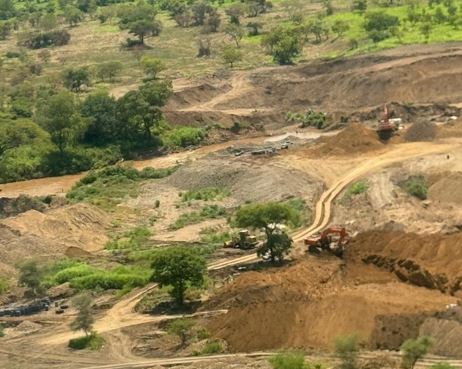The Chief Administrator of the Greater Pibor Administrative Area (GPAA), Gola Boyoi Gola, has raised an alarm over the presence of more than 50 illegal Ethiopian mining companies operating in the Raad area of Jebel Boma County.
According to Gola, the companies have reportedly encroached 15 kilometers into South Sudanese territory, threatening both the environment and local communities. He expressed regret over the lack of a response from the national government despite repeated appeals.
“This area is rich in gold and if our government can focus on it, we could significantly improve South Sudan’s economic situation instead of relying solely on oil,” he lamented. “We are allowing foreigners to steal our resources in plain sight.”
Gola emphasized that the issue should not be viewed exclusively as a local or regional concern but as a national crisis requiring urgent attention.
“This is not just a problem for Greater Pibor or the people of Raad and Boma, it is a national threat that requires immediate action to halt illegal activities and protect our resources,” he said.
The illegal mining activities in the Raad area are also causing substantial environmental damage and the chief administrator revealed that the use of mercury in the gold extraction process has polluted the Akobo River, resulting in fatalities among residents, fish, and wildlife.
“The Akobo River is no longer safe for human use or wildlife due to mercury contamination. Mercury is a dangerous substance that harms both humans and the environment,” he stated. “We need immediate government intervention to regulate mining activities, even if licenses are issued in the future, such operations must comply with environmental standards and use safer methods.”
Gola called on the governments of South Sudan and Ethiopia to collaborate in addressing the illegal mining crisis near the border. He urged South Sudan’s Ministry of Environment to enforce strict regulations on mining to prevent further environmental degradation and ensure sustainable resource management.
South Sudan is rich in natural resources, including gold, copper, iron ore, and oil. However, the mining sector remains underdeveloped due to limited infrastructure, weak regulatory frameworks, and political instability.
Gold mining, both artisanal and industrial, holds an important economic potential.
In recent years, local communities and foreign entities have engaged in mining, often without proper licenses or oversight. This has led to resource theft, environmental destruction, and social conflicts.
The South Sudanese government has tried to attract investors to the mining sector by drafting regulations and offering licenses. However, enforcement remains challenging, with illegal mining operations persisting in several regions, including Greater Pibor.
Golas said the situation in Jebel Boma County needs the government to strengthen border security, improve resource governance, and regulate the mining industry to prevent exploitation and environmental harm.




